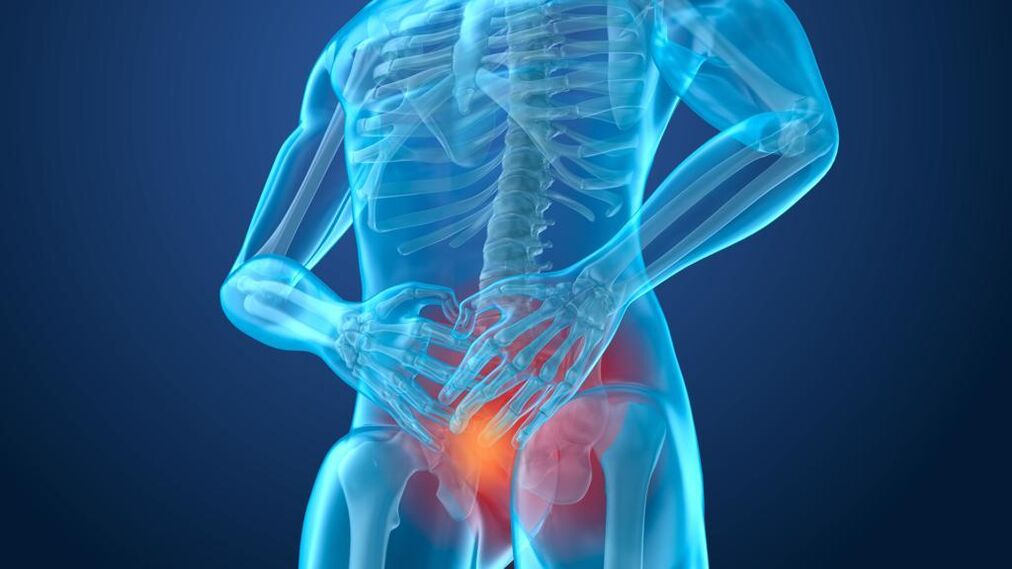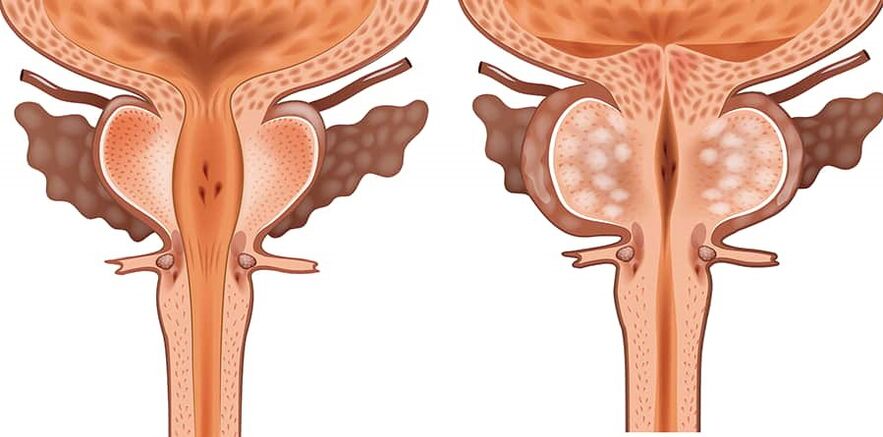According to statistics, prostatitis is a disease that affects one in ten people. Pathological diagnosis is mainly between 30 and 50 years old.

Many men are embarrassed to talk to the doctor about the symptoms of prostatitis, which causes the disease to turn into a chronic form, complicates the treatment, and develops reproductive function problems. It is important to start treatment at the initial stage of the pathological process.
Regarding which drugs are most commonly used by men to treat prostatitis, they are considered to be the most effective.
What is prostatitis
Prostatitis is a disease characterized by an inflammatory process in the seminal glands. The glands perform many important functions, one of which is to produce specific ejaculatory secretions to protect and nourish sperm. The liquid contains enzymes, proteins, fats, and hormones. Otherwise, the reproductive system will not work properly.

Another important function of the prostate is to liquefy the sperm, making the sperm more mobile and easier to reach the goal.
If the inflammatory process starts in the prostate, its work will be disturbed. In this case, men will feel characteristic symptoms.
Causes and signs of prostate inflammation
The main source of the development of prostatitis is the penetration and stagnation of the infection in the seminal tissue. Bacteria and bacteria enter the prostate from:
- Genitourinary organs;
- Remote chronic infections and bloodstream infections (tooth caries, sinusitis, sinusitis, flu, pneumonia, tonsillitis, tuberculosis);
- Inflamed organs nearby (inflammation of the rectum), etc.
Factors before the development of the disease:
- Long-term abstinence;
- Wear too tight clothes;
- Alcoholism, smoking, drug use;
- Frequent interruption of sexual intercourse;
- Poor ejaculation;
- Irregular sex life;
- Lack of motivation;
- constipation
- Conditions that suppress the immune system (stress, unhealthy diet, lack of sleep);
- Single or permanent hypothermia;
- Whether there is chronic infection (bronchitis, tonsillitis, cholecystitis);
- Strong sexual arousal and no more sexual intercourse afterwards;
- Delayed urological diseases (cystitis, urethritis);
- The transfer of genital infections (gonorrhea, trichomoniasis).
Hyperplasia or prostate adenoma with a benign course can also cause the development of the disease. In addition, perineal trauma is the cause of prostatitis. These are often seen among motorcyclists, motorists, cyclists, etc.

It should be noted that the diagnosis frequency of bacterial prostatitis is 8 times that of non-infectious bacteria. The main reason for the latter is glandular stagnation. This leads to difficulty in blood circulation through small blood vessels, swelling of prostate tissue, and increased free radical oxidation of lipids. All these processes create conditions for inflammation and severe pain of the perineum and genitals.
During the exacerbation of male prostatitis, there are:
- Increased urination;
- Urine may contain blood impurities, pus; mental illness-restlessness, lack of sleep, anxiety;
- Violation of the urination process-it may be difficult and painful;
- Pain in the scrotum, rectum and penis;
- Erectile dysfunction.
As the condition gets worse, the body temperature may rise slightly.
Pharmacological classification of prostatitis drugs
The following are the categories of pharmacological drugs used to treat prostatitis:
- Antibacterial drugs for prostatitis (ciprofloxacin, azithromycin). They are prescribed to eliminate pathogenic microorganisms. With the help of the active substances that constitute the drug, the pathogens that cause the infection process are destroyed. Antibiotics are taken during the acute and remission phases of the disease.
- Alpha blocker (tamsulosin). When it is necessary to improve urodynamics, promote the patient's urine outflow and reduce the possibility of hyperplasia, the doctor will prescribe this group of drugs.
- Antispasmodic drugs (drotaverine hydrochloride, papaverine, metazole sodium). The drugs prescribed to treat prostatitis relieve pain, relax the smooth muscles of the prostate and improve blood circulation.
- Non-steroidal anti-inflammatory drugs with analgesic effects (toperisone hydrochloride, nimesulide, meloxicam, diclofenac). This class of drugs used to treat prostatitis is used to treat pain, cramps, increased perineal muscle tone, urination problems, and inflammation.
- Analgesics (Memetazole Sodium, Diclofenac). relief the pain. The prescription forms are tablets, rectal suppositories, and injections.
- plant repair. These medicines only contain natural herbal ingredients. Prescription and medicine are used together. Designed to eliminate pain, inflammation, and relieve mental stress. They are prescribed in chronic and aggravated forms (in combination with other drugs).
- Hormonal drugs for prostatitis (cyproterone acetate, flutamide). Eliminate the inflammatory process, reduce gland swelling, and normalize the urination process.
Essential medicine for prostatitis and benign prostatic hyperplasia
Next, we will describe in more detail the drugs most commonly used by doctors to treat prostatitis and are the most effective in fighting the disease.
Tamsulosin hydrochloride
Tamsulosin hydrochloride is prescribed to treat benign prostatic hyperplasia (adenoma). It belongs to the group of alpha-blockers. Available in capsule form. The main active ingredient of the drug is tamsulosin hydrochloride. This ingredient helps reduce the tension of the smooth muscle of the prostate.
The drug is not used:
- In childhood
- Severe liver failure;
- Orthostatic hypotension (reduced pressure when standing).
Uncontrolled drug intake and contraindications may lead to the following undesirable consequences:
- dizziness;
- rhinitis;
- Skin rash, accompanied by itching and redness;
- Frailty Syndrome
- A sharp drop in blood pressure;
- Strong heartbeat.
The frequency of drug use is once a day. Rinse the capsule with plenty of water. The reception should take place in the morning before the meal.
When taking drugs, especially in the first few days, people who engage in complex mechanisms and drive cars should pay attention.
Pumpkin Seed Oil
Herbal preparations. It is prescribed for the treatment and prevention of prostatitis.
The main active ingredient restores the function of the prostate due to its anti-inflammatory effect and improved microcirculation. In addition, the substances that make up pumpkin seed oil can resist the production of the hormone dihydrotestosterone, which is responsible for the growth of the prostate, improving the function of the kidneys and liver, and cleaning the intestinal toxins and toxins.
The drug should be taken 3 times a day, 1 capsule after eating. Rinse the capsule with plenty of water. The course of treatment is 1 month.
Side effects after taking the medicine are rare. Basically, reactions can be observed from the gastrointestinal tract-nausea, abdominal pain, heartburn. If you take the drug for a long time, you may experience bowel disturbances.
Contraindications include gastrointestinal mucosal ulcers at the stage of exacerbation, cholelithiasis.
Preparations: Pumpkin Seed Powder; Compositae Plant Extract; Poplar Leaf Extract; Pumpkin Globulin
The drug is used to treat chronic prostatitis, benign prostatic hyperplasia and dysuria.
The drug is produced in the form of tablets, and because of its herbal ingredients, it is well tolerated by patients. We can only occasionally notice allergic reactions to component medicines.
The drug is taken 3 times a day, 2-4 tablets each time. The treatment time is 12 weeks.
Preparation of preparations: pumpkin seed powder; selenium; essential oil. Zinc citrus pectin; nettle extract; lycopene obtained from tomato; African palm fruit extract; African plum bark extract
The drug is a biologically active food supplement for men with prostate disease. Comes in pill form.
You must take the medicine once a day when you eat with water. The admission time is 30 days. Men tolerate prostatitis drugs well and do not cause side effects. In individual cases, patients will have an allergic reaction to the components of the drug.
Herbal preparations with the following ingredients: larvae, Canadian white poplar, sawtooth
An herbal preparation for male prostate and genitourinary system diseases. This tool can eliminate pain, relieve inflammation, and eliminate spasms.
The main indications for using the drug are:
- Benign prostatic hyperplasia;
- Inflammatory diseases of the genitourinary system;
- Chronic and acute urine retention;
- Enuresis, pyelonephritis;
- Renal colic;
- Urinary tract stone disease.
The medicine for prostatitis is produced in the form of drops. You need to take 5-15 drops at a time. The frequency of drug use is 3 times a day. The duration of treatment depends on the pathological process, but should be at least 6 weeks. The drug should be drunk half an hour before or after a meal, and then slowly dissolve in the mouth.
Contraindications include individual intolerance to the ingredients of the drug and children under 12 years of age. As for adverse reactions, they rarely occur and only appear in the form of allergies.
How to choose medicine
According to the form of the disease, drugs for the treatment of prostatitis must be selected. When the condition gets worse, antibiotics must be prescribed first. The sooner you start taking antibacterial agents, the faster the symptoms disappear, and the less likely it is that complications and diseases will turn into chronic diseases.
If the disease is accompanied by pain in the genitourinary system, the mental abnormalities are irritability, anxiety, insomnia, and sexual dysfunction. In this case, you should take medicines that can improve blood circulation and eliminate pain, inflammation and mental problems. For this purpose, the following personnel have been appointed:
- Analgesics
- Antispasmodic
- Non-steroidal anti-inflammatory drugs;
- Antibacterial drugs (frequent attacks);
- Immunomodulator
- Herbal tranquilizer.
In any case, only a doctor can prescribe drugs for prostatitis after the examination. Self-treatment can lead to serious consequences, one of which is infertility.




































